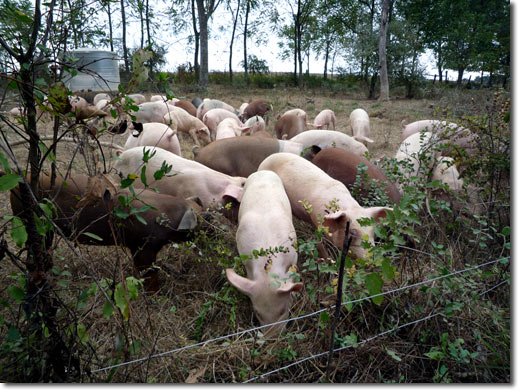I'm awakened and convicted by the facts, the hidden truths revealed and the desperate thirst for fulfillment.
The Omnivore's Dilemma, by Michael Pollen
Ask yourself, what did you eat for breakfast today?
If you said cereal and milk - where did that milk come from? Which cow supplied your milk? Were there hormones? Was it a grass-fed cow? Or was it corn-fed, unnaturally, just to fatten it up quicker so we can get our milk faster?
If you said eggs and bacon - oh boy. Were the eggs from an industry farm where the hens lay eggs in crates like this:

Did your bacon come from a place like this:

or like this:

What questions do you ask yourself when you are eating?
- Does this taste good?
- Does this have enough protein for my dietary needs?
- Was this egg produced with hormones?
- Should I worry about E. Coli right now?
- How many cows went into making my hamburger?
- Would I be able to find the hen that laid this egg, or is she a number in 20,000?
http://www.blogger.com/img/blank.gifhttp://www.blogger.com/img/blank.gif
The biggest take away for me after reading this book - and still reading it - is this:
I live in Colorado, I need to eat Colorado meat and vegetables. When I can't, I want to know where and how my food was produced. What I eat is who I am and I do not want to be a hormone-laden, medically-treated, unnaturally corn-fed, corn by-product. I want to slice into my blood and see that the calories running through my body are sun-kissed, grass-fed, naturally produced and following nature's cycle. Ihttp://www.blogger.com/img/blank.gif don't want to slice into my skin and see excess nitrogen, drug cocktails from cows, corn-like substances and unnaturally fed meat products. What next? Tell you all about this book, about sustainable farming and give you a way to make changes.
Go to
and find a farm near you to buy your meat, eggs, and dairy. Find the farmer's market closest to you and support local agriculture. Sure, it is hard to eat 100% local because we have been trained to buy packaged, processed and fortified foods. Find your local farmer's marker here:
cost-conscious people beware: you will pay more for your food now. But you will have less medicine to buy, less trips to the doctor, less chance of heart disease, diabetes, obesity, depression, and on and on and on...
How did God intend for us to take care of our bodies? He gave us meat and vegetables to cultivate, harvest and prepare. He gave us a conscious to know what we should be eating and what we should not. As we get to know our food, we get to know ourselves. We are what we eat.
So what type of person will you become?




